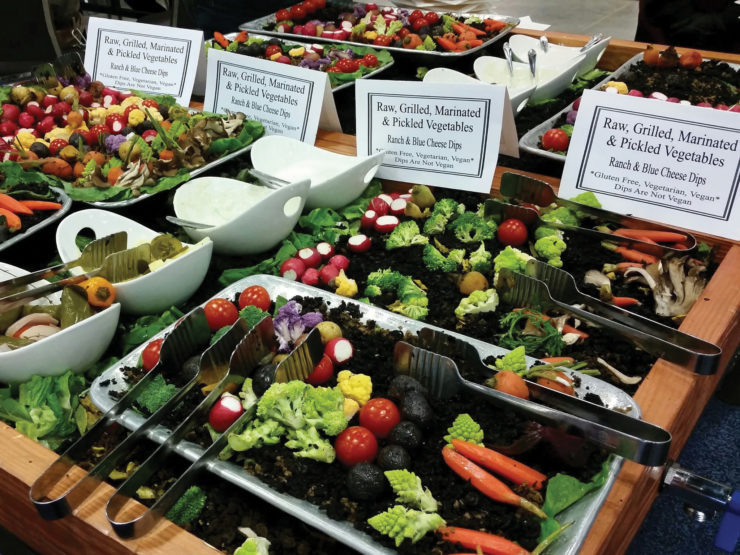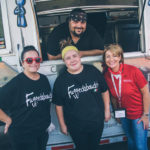 When Kimberly Smith was reviewing attendee feedback following the 2016 Association for the Advancement of Sustainability in Higher Education (AASHE) Conference & Expo, she kept coming across the same complaint: The event’s F&B options had left attendees with a bad taste in their mouth.
When Kimberly Smith was reviewing attendee feedback following the 2016 Association for the Advancement of Sustainability in Higher Education (AASHE) Conference & Expo, she kept coming across the same complaint: The event’s F&B options had left attendees with a bad taste in their mouth.
In fact,“2016 didn’t work out so well,” Smith, the director of conferences and events for AASHE, told Convene. “We got slammed on our evaluations. Vegans didn’t have enough choices. I had to do a special meal for people who had very unique chemical allergies. It was overwhelming to create a program that pleased our attendees.”
In addition to accommodating individual dietary preferences and restrictions, some of the 2,000 attendees questioned why the menu was at odds with the organization’s mission to advance sustainable practices. According to AASHE’s website, its “annual conference is the largest stage in North America to exchange effective models, policies, research, collaborations, and transformative actions that advance sustainability in higher education and surrounding communities.”
“Some of our members asked why we were still serving meat at our conferences,” Smith said. “We’re focused on sustainability and lowering the carbon footprint, but animal-based foods are generally more resource intensive than plant-based foods.”
The feedback, she said, “was a wakeup call. I deduced that we’re going vegetarian from here on out.” Smith’s bold plan for an all-vegetarian menu, however, was not met with unanimous approval. “Not everyone thought we should go meatless,” she said. “Even some of our staff indicated that they weren’t sure of the decision.” Nonetheless, it was determined that AASHE’s 2017 meet-up would be meat-free.
Collaborating With Catering
Smith had a head start on the transition. AASHE had embraced a Meatless Monday campaign at past conferences. However, it’s no secret that chicken shows up on nearly every menu at meetings and events. As Smith looked ahead to her 2017 conference in San Antonio, she knew that she would have to develop a close relationship with her caterer,the RK Culinary Group at the Henry B. Gonzalez Convention Center, to explore meat — and poultry — alternatives.
“Last year’s caterer was fantastic,” Smith said. “I met with the chef, and he really listened to my vision. I shared some vegetarian recipes I found that seemed like they might be good for our audience. I listened to his advice. It was a very close collaboration. We met face-to-face, and I shared a document with my catering standards. After some back-and-forth, we did a tasting. Out of five dishes, I think I chose three and made some small modifications to the others.”
How was the vegetarian F&B program received by attendees? As event organizers know all too well, you can’t please everyone. But overall, Smith said, “the majority of our post-event feedback indicated that it was a step in the right direction and demonstrated a commitment to sustainability.”
Doing Without Dairy
Smith plans to take that commitment to the next level at the 2018 AASHE Conference & Expo, Oct. 2–5, in Pittsburgh. “I want to move to a completely plant-based menu,” she said. “I’m not sure if I’ll be able to, but I’m going to try.”
Smith is working with Levy to add more raw foods to the offerings with an aim to eliminate dairy from the menu. “If I eliminate dairy, I won’t have cheese,” she said. “What conference doesn’t have cheese? Considering the energy that goes into the cow, though, it has a huge environmental footprint.”
While she’s aware that going from vegetarian to vegan might prove challenging, she’s focusing more on what she’s enhancing rather than subtracting — i.e., on creating an experience. What might be lacking from an ingredients perspective will be made up for in presentation.
“Last year, we had an increase in our social-media activity because attendees were sharing more pictures of their food,” Smith said. “In 2018, I hope we can do something really unique with our opening reception with raw and grilled vegetables displayed in garden boxes. I want attendees to feel like they’re picking from a garden.”
Better Budgeting
In addition to the conference’s first-ever, all-vegetarian menu, AASHE’s Kimberly Smith made other big F&B moves in 2017 that benefited her budget — bringing the average price of a meal down by $4 in a year-over-year comparison.
For one, she eliminated breakfast from the menu. “Taking this step allowed me to put more money into creating more bountiful lunches,” Smith said. “We had six hotels, and every single one of them offered a buffet breakfast with great options. Eliminating this one meal allowed me to put more money into the lunches and refreshment breaks.”
While Smith used to serve only coffee and tea during those breaks, she said that the adjustment gave her the extra wiggle room to add food along with the hot beverages.
Smith said she is also able to stretch her F&B budget by working closely with caterers. “I always ask the caterer what the menu is shaping up to look like for the groups meeting before our conference,” Smith said. “That way, we can explore opportunities for menu matching and create economies of scale. I believe it’s vital to show suppliers how I’m saving them money, and as a result, making them money while reducing my costs.”
Learn more about the 2018 AASHE Conference & Expo at aashe.org/conference/.
F&B is supported by Louisville Tourism, gotolouisville.com.



